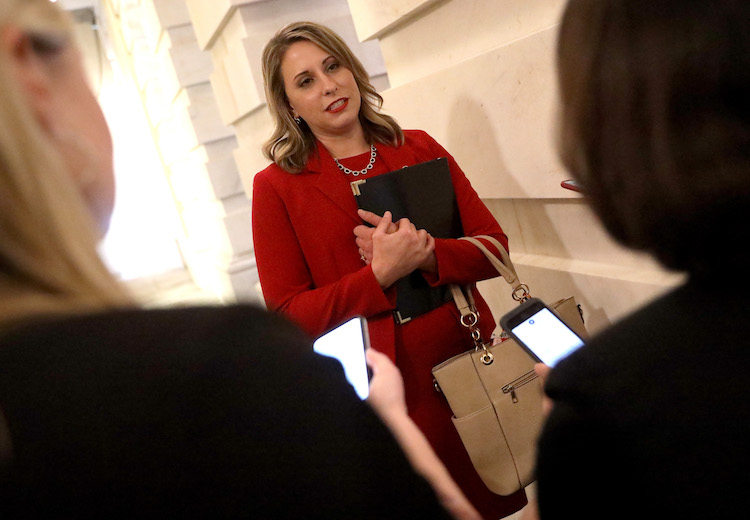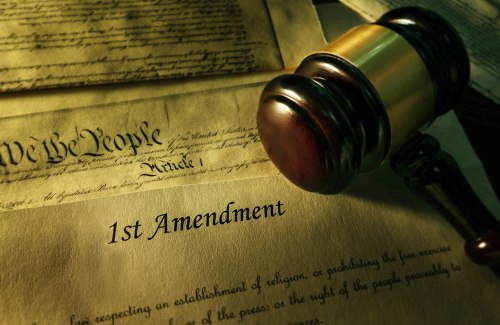First Amendment defense claims could threaten ‘revenge pornography’ statutes

Image from Shutterstock.com.
Matthew Rychlik was not most people’s idea of a good fiance. But the state of Illinois thought his future wife Bethany Austin’s breakup message went too far.
After Austin found nude selfies of another woman among Rychlik’s text messages—which both Rychlik and the other woman knew were going to Austin’s iPad—she tried to work out the relationship with him. But when he told friends and family that they broke up because Austin was “crazy” and didn’t cook or clean, she got mad. She sent out a letter with her take on the breakup—and included the pictures.
That put Austin in violation of the Illinois “revenge pornography” statute, which criminalizes dissemination of private nude or sexual images without the subject’s consent. But at trial in McHenry County, a semi-rural area in northeast Illinois, Austin argued that the law was an unconstitutional restriction on her freedom of speech. The trial court agreed, holding that the law doesn’t serve a compelling government interest because the harms of revenge porn are speculative.
As a result, the state of Illinois went before its state supreme court last May, defending the statute at oral argument. Around the same time, Jordan Bartlett Jones, was making a similar First Amendment argument in the Texas Court of Criminal Appeals. Appeals courts in Wisconsin and Vermont rejected First Amendment challenges to revenge porn statutes in 2018—but in Texas and Illinois, the lower courts have given the First Amendment claims a foothold.
Decisions striking down those laws could threaten revenge porn laws in all 46 states (plus Washington, D.C., and Guam) that have them. But Mary Anne Franks, president, legislative and tech policy director of the anti-revenge-porn group, the Cyber Civil Rights Initiative, says that could be for the best.
“Sometimes these challenges are legitimate, in the sense that it may be good for the legislature to take a pretty hard look at whether or not they’ve crafted the best law possible,” says Franks, who teaches criminal and First Amendment law at the University of Miami.
Regulating revenge porn
Laws like the ones being challenged, started springing up in early 2010, when it started becoming common to see intimate images shared without the subject’s consent. Some images become public via hacking or extortion, but often someone puts them online after a breakup in order to hurt the person depicted. In those cases, the poster may send the images directly to the victim’s employer, family and friends or to a for-profit revenge porn website.
However, it got harder to do that with impunity starting around 2013, when states began passing laws outlawing revenge porn. Four states: Wyoming, Mississippi, South Carolina and Massachusetts still don’t have specific laws outlawing revenge porn. New York and Nebraska are the most recent states to pass bills outlawing the offense.
There’s little cohesion among state revenge porn laws. In 2016, U.S. Rep. Jackie Speier, D-Calif., introduced a bill that would make revenge porn a federal crime, but it didn’t pass. In 2017, Sen. Kamala Harris, D-Calif., and two other senators introduced a bill that would criminalize the distribution of revenge porn. Speier and U.S. Rep. John Katko, R-N.Y., introduced a third bill in May, the SHIELD Act, which is pending with the judiciary committee.
The resignation of former freshman U.S. Rep. Katie Hill, D-Calif., in October, after revealing pictures of her and a campaign staffer were made public online, sparked renewed public interest in revenge porn. Generally, recent pushes to regulate revenge porn coincide with growing awareness around sexual harassment and abuse as well as discussions around the government’s role in regulating social media.
It’s tough to say how many people have been prosecuted, but Franks says only a few have brought the sort of First Amendment challenge at issue in the four appellate cases. A fifth First Amendment challenge, filed by the ACLU of Arizona (Antigone Books et al v. Horne), led a federal district court to strike down that state’s first revenge porn law in 2015.
 U.S. Rep. Katie Hill delivers a final floor speech before resigning from Congress. Photo by Win McNamee/Getty Images.
U.S. Rep. Katie Hill delivers a final floor speech before resigning from Congress. Photo by Win McNamee/Getty Images.
Speech or Privacy?
Franks wrote model laws for the Cyber Civil Rights Initiative that she believes can stand up against such a challenge. However, she says she believes it’s better to view anti-revenge-porn statutes as privacy laws rather than laws restraining unpleasant speech. Almost nobody sees laws against disclosing Social Security numbers or medical records as First Amendment violations, she notes.
“The legal harm here is the violation of privacy,” says Franks, who in 2019 published The Cult of the Constitution: Our Deadly Devotion to Guns and Free Speech. “And if you write it that way … you also make it clear why this is not a First Amendment problem.”
Nonetheless, free speech has been the theme in all four of the challenges that recently rose to the appellate level. As a general rule, government may restrict speech when it falls into one of a select few categories, like obscenity or “true threats.” Laws may also regulate the content of speech if they pass a test called strict scrutiny, which asks whether the law is narrowly tailored to achieve a compelling government interest and is the least restrictive way of achieving it.
The Vermont Supreme Court ruled in 2018 that personal privacy is a compelling enough state interest to keep its revenge porn law on the books. The Court of Appeals of Wisconsin also cited personal privacy when upholding its revenge porn law in 2018, although that court was analyzing whether the law was too broad, rather than looking for a compelling state interest.
But privacy failed as an argument in Illinois and Texas. The McHenry County, Illinois, trial court that considered Austin’s case said the harms of revenge porn are “speculative” and therefore don’t create a compelling government interest. The 12th Court of Appeals in Texas assumed that privacy was compelling without examining it, but concluded that the statute was not the least restrictive means of protecting privacy. That’s because it permits prosecutions for speech defendants didn’t know was in prohibited categories, the court said.
Both of those decisions were then being challenged before the highest criminal courts in their states. The Illinois Supreme Court heard oral arguments in May and the state supreme court ruled in October that revenge porn is not constitutionally protected free speech; the Texas Court of Criminal Appeals declined to hold oral arguments, but briefing finished in April.
When it rules, the Texas court will have an unusual issue before it: whether to apply intermediate scrutiny, a less stringent test for whether a government restriction on speech is legal. Normally, this is used when the state regulates the time, place or manner of the speech, rather than its content.
But in its briefs, the office of the Texas State Prosecuting Attorney argues that intermediate scrutiny should apply when the speech is not on an issue of public concern. Assistant state prosecuting attorney John Messinger argues that protecting robust public debates is the purpose of the First Amendment, whereas the Supreme Court has more often permitted regulations of commercial speech or speech about private individuals.
 Image from Shutterstock.com.
Image from Shutterstock.com.
“SCOTUS has repeatedly said that not all protected speech is equal,” Messinger says. “My argument that the violation of a victim’s right to privacy is entitled to less constitutional protection than issue advocacy in a public park might be novel, but it is hardly bold.”
But Mark Bennett, the Houston criminal defense lawyer representing Jones, notes that the Supreme Court has never adopted any “public concern” test, and that the cases the state cites in support are about civil issues, such as defamation, rather than criminal law.
He contends that the Texas law fails analysis of both strict scrutiny and overbreadth for the same reason: Almost all the banned speech is constitutionally unprotected, aside from a few instances of obscenity or child pornography. Whether revenge porn is hurtful or embarrassing is beside the point. He argues: People say unkind things all the time without being criminalized.
In Illinois, the state also invoked privacy as a compelling government interest. But defense lawyer Igor Bozic says the woman who sent Rychlik her nude pictures waived her right to privacy by giving them to someone else, and would have even if she hadn’t known Austin would receive the pictures. He believes it’s not the state’s business to protect adults from themselves—an argument also made in the dissent to the Vermont case—and that there’s no social harm here great enough to justify restricting speech.
“I don’t know any situation in the law … where you can get punished for whatever you do with your property,” he says.
Bennett, who is defending seven or eight other clients charged with violating the Texas revenge porn statute—as well as defendants charged with harassment, identity fraud and online impersonation—says he takes those cases precisely because the speech is unpopular.
“If we allow the restriction of speech based on ‘violations of privacy’ or ‘emotional harm,’ there is no limit to the speech that may be restricted,” Bennett says.
But Franks said he thinks that’s a red herring. Civil libertarian groups skeptical of revenge porn bans often strongly back privacy laws, she notes, and she thinks gender could explain the inconsistency.
“Why do we not think of naked photos as being as deserving of privacy protection as things like our medical records?” she asks. “It’s hard to escape the conclusion that the one real difference here is that the primary targets of this form of privacy violation tend to be women.”



